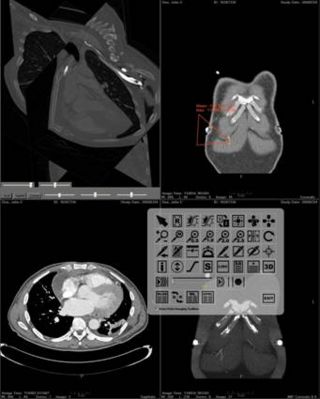Difference between revisions of "Collaboration/NWU/Radiology Workstation"
From NAMIC Wiki
| Line 39: | Line 39: | ||
* Slicer3 compiled as a managed dynamically linked library that can be directly integrated into a .Net application | * Slicer3 compiled as a managed dynamically linked library that can be directly integrated into a .Net application | ||
* The renderers and their interactors can be placed into .Net user controls for direct integration with a .Net GUI | * The renderers and their interactors can be placed into .Net user controls for direct integration with a .Net GUI | ||
| − | * The basic foundation for converting KWWidgets has been devised, but much work remains. The process involves using a slight change to the KWObject class, and | + | * The basic foundation for converting KWWidgets has been devised, but much work remains. The process involves using a slight change to the KWObject class, and then deriving inherited controls on the .Net side |
| − | * The | + | * The process needed to reassemble the 3D Main Viewer is under works, but this part of the project is in its infancy |
</div> | </div> | ||
Revision as of 19:25, 22 June 2007
Home < Collaboration < NWU < Radiology Workstation Return to Project Week Main Page |
Key Investigators
- Northwestern: David S. Channin, Pat Mongkolwat, Skip Talbot, Alex Kogan, Vladimir Kleper
- Isomics: Steve Pieper
Objective
The goal of our project is to be able to use Slicer3's advanced imaging algorithms and 3D functionality from inside a clinical workstation being developed at Northwestern University. We'd also like to reconfigure use of the main viewer for a new way to interact with the volume that might be more efficient for clinical use. Our main objectives to accomplish this goal include:
- Integrate the rendering and functionality of Slicer3 into a .Net foundation GUI for use in a clinical workstation
- Create a new representation of the 3D volume as a cube with an oblique cut plane rather than the default three orthogonal cut planes
Approach, Plan
To implement this integration process, we have taken the following steps:
- Convert Slicer3 into a managed class object
- Extract the renderers through existing accesor methods and add them to managed renderers using a VTK .Net wrapper
- Convert KWWidgets into .Net Controls
- Implement volume cube representation with existing Slicer3 code
Progress
In regards to the steps listed previously, we have made the following progress:
- Slicer3 compiled as a managed dynamically linked library that can be directly integrated into a .Net application
- The renderers and their interactors can be placed into .Net user controls for direct integration with a .Net GUI
- The basic foundation for converting KWWidgets has been devised, but much work remains. The process involves using a slight change to the KWObject class, and then deriving inherited controls on the .Net side
- The process needed to reassemble the 3D Main Viewer is under works, but this part of the project is in its infancy
References
- A Translation Station for Imaging: P. Mongkolwat, T. Lechner, T. Johnson, A. Kogan, S. Talbot, D. S. Channin; Radiological Society of North America, Chicago, IL. November 2006.
- Advancing Advanced Visualization in the Clinical Environment: S. Talbot, P. Mongkolwat, D. S. Channin; Society for Imaging Informatics in Medicine (SIIM), Providence, RI, To be presented, June 2007.
